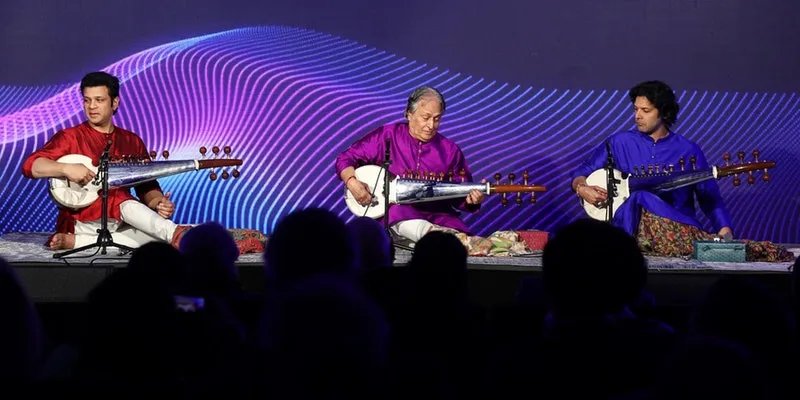A tête-à-tête with Indian classical music legend Amjad Ali Khan
Sarod maestro Amjad Ali Khan along with his sons Ayaan Ali Khan and Amaan Ali Khan spoke to YSWeekender about the future of music.
Sarod maestro Amjad Ali Khan is one of India’s greatest musicians. Born into a classical musical family, he has performed internationally since the 1960s. Son of Hafiz Ali Khan, Amjad Ali Khan, like his father, received many accolades and awards in his six-decade-long career.
While his father received India’s third-highest honour, the Padma Bhushan, the sarod maestro was conferred the Padma Vibhushan in 2001, the second-highest civilian award in India.
Over the years, the sarod maestro, along with his sons Ayaan and Amaan Ali Khan, has promoted global peace through music and has played for a number of gatherings across the world as well.
The ustad believes India needs to love its classical music and respect the way of the guru, which otherwise has been lost. He adds that social media has given artistes a platform to express themselves. However, a big change has happened within the public, where they are prepared and know what to expect at the concert.

Ustad Amjad Ali Khan
Nonetheless, the maestro and his sons feel music is about both quality and quantity.
YSWeekender caught up with the trio, who recently performed at the Levi's Stadium in the Bay Area in the US. Promoted by HCL Technologies as part of HCL Concerts, a platform that captures India’s cultural heritage, they showcased seven generations of family legacy with Sarod.
Edited excerpts from the interview
YSWeekender: It is very difficult to summarise a great life. Do you have any favourite recollections of your tours?
Amjad Ali Khan: My first foreign tour was in the US in 1963. At the time, my father was very worried about me because he had never been on a plane before, and wondered about the safety of his youngest son. He was not okay with me going to the US but he finally realised that I must go. The 60s were an era when Indian music was being discovered by the Western world. Yoga too was becoming popular. I travelled to the US for two months as an 18-year-old. It was a memorable time because so much was happening around music.
I played in the US in 1971, and later, in 1984, in Los Angeles. In LA, I have to tell you a memory which has left me sad. After my last concert, I met someone who requested me to extend my trip for a week. I asked them why – as I was already touring for a while – and wanted to return because I was exhausted from the constant travelling.
The person told me that Michael Jackson wanted to meet me at home, and hence, requested if I could make an accommodation to meet him. I was exhausted, and I went back home to India, telling the person that I would love to meet Michael at a later date. I never got to meet Michael, and when he passed away, I felt very sad. I wish I had met him.
YSW: You never settled down abroad with so many requests, why?
AAK: A lot of people wanted me to settle down in the US and teach Americans Sarod, but I never wanted to leave India. India has made Amjad Ali Khan, and every state in India has nurtured and encouraged me. I was playing music even before my teens, and because of that, I was not able to complete my education. However, my sons have been to school.
I was the youngest child and I had to take care of my large family in Gwalior. The family house has now been converted into a museum. My favourite memory will be the concert in Carnegie Hall in 1997 when I played with my sons for the 50th anniversary of Indian Independence. I got a standing ovation before and after the show (usually, a musician gets an ovation after the show). That moment was very heartening to me.
YSW: What are your thoughts about the music scene today?
AAK: Children in the US are taught to appreciate music from a young age, and teaching music is given a lot of respect. Over time, I see India losing that culture. The basic difference being the meaning of the artiste is much bigger in the US than back home. Indians are very choosy when it comes to classical music.
For example, there cannot be another Bhimsen Joshi or Kumar Gandharva. There were about 12 musicians who made Indian classical music what it is today. We practised a lot and gave our lives to the guru who taught us. It was always about quality than quantity.
So, in an era of modern music and gadgets, classical music stands out if you are performing in a concert in its true form, and Indian classical music has no rule book. With all the changes happening in the world, it is the music that cuts across all boundaries of hate created by politics and religion.
I never forced or persuaded my sons to follow after me, but shared my art with them and today, they have become sarod players by themselves.
I was never good at dealing with toddlers. I created an album for children through which they could get into classical music.
You know, we come from the religion of sound. It is much more effective than yoga. There is no manipulation in sound; people can tell when it sounds bad.

L-R: Amman Ali Khan, Amjad Ali Khan, and Ayaan ali Khan
Amaan and Ayaan: Today, kids refer to Indian classical music with rock shows. They are enthralled by the light and the theatrics. It becomes a comparison and therefore, kids do not take to Indian classical music directly.
YSW: What are your expectations of music today?
Amaan and Ayaan: For the younger generation, it is the practice alone. There are no shortcomings for hard work. Be humble and have one guru who will take you away from the darkness and show you the light.
These days, young people learn from a guru but never acknowledge them. Hard work beats talents. Our mother was a classical dancer, and she knew the journey of honing our craft. We grew up with Bharatanatyam and learned music every day.
We practised for two hours each day. Parents play an important role in bringing up a child and their education. Our father was very strict when it came to learning music. He would tell us what is right and wrong, and that helped us become better musicians.
If musicians revere their guru, then it is everything and for us, our father was our guru. There is a transition in India, and we have seen students who use the guru’s knowledge to market themselves. That’s not done. They become selfish and commercial. Times are changing, and let us see where the journey goes. We have not taken students yet and we have not yet met students who want to learn from us.
(Edited by Suman Singh)









